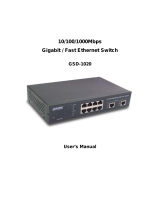Page is loading ...

KS-124
24-Port 10/100 Workgroup Switch
User’s Guide
DOC.070524-KS124

1. Introduction
The 10BASE-T/100BASE-TX Switches which are high-performance Fast
Ethernet switches designed for the network core. It provides 24
10BASE-T/100BASE-TX ports that can significantly improve the performance
of your network’s backbone, and deliver the throughput needed to support a
broad range of advanced network applications. With Fast Ethernet Switches
high performance bandwidth, it provides the quickest solution to meeting the
growing demands on your network’s limited resources.
2. Features
z Complies with the IEEE 802.3 10Base-T Ethernet and IEEE 802.3u
100Base-TX Fast Ethernet standard.
z 24-port 10/100Mbps Auto-Negotiation.
z Half/Full duplex capability for each port.
z Support TP interface Auto-MDI/MDI-X function for auto TX/RX swap.
z Automatic Source MAC Address Learning and Aging.
z Support up to total 4K unicast addresses entries.
z Support up to 2Mbits data buffer.
z Support Store & Forward architecture and performs forwarding and
filtering.
z Broadcast Storming Filter.
2

z Runt and CRC Filtering eliminates erroneous packets to optimize the
network bandwidth.
z Support to handle up to 1522 bytes packet.
z LED indicators for simple diagnostics and management.
z Internal switching power supply.
z Plug and Play.
3. Package Contents
z Rackmount Kit.
z User guide.
z Power cord.
z 10/100Mbps Fast Ethernet Switch
4. Hardware Introduction
4.1 Front Panel
The unit front panel provides a simple interface monitoring the Switch.
See the chart in section 4.2 for the status of each LED denotes.
4.2 LED Displays
LED Function Color Description
PWR Green Lit: Power on
LNK/ACT Green Lit: Indicates there is a link
Flash: indicates there is an activity
10/100 Green Lit: 100Mbps
Unlit: 10Mbps
3

4.3 Rear Panel
The rear panel of the 24-port Fast Ethernet Switch indicates an AC inlet,
which accepts 100-240VAC 50-60Hz power input.
Specifications
Standard
IEEE 802.3 10Base-T Ethernet
IEEE 802.3u 100Base-TX Fast Ethernet
Data Transfer Rate
- Ethernet : 10Mbps (half-duplex)
20Mbps (full-duplex)
- Fast Ethernet : 100Mbps (half-duplex)
200Mbps (full-duplex)
Network cable
-100Base-TX UTP/STP category 5 cable
-10Base-T UTP/STP category 3 or 5 cable
Ports
24 10/100Mbps Auto-MDI / MDI-X Ports
LED indicators
System – Power LED
Individual port – link/activity and speed LEDs
Dimension
283mm(W) x 178mm(D) x 44mm(H)
Temperature
Operating 0°C to 50°C (32° to 122° F)
Storage -20°C to 70°C (-4° to 158° F)
Humidity
Operating 10% to 90% RH, Non-condensing
Storage 5% to 90% RH, Non-condensing
Power Input
100 – 240VAC, 50 / 60Hz, Auto-sensing
Registrations
FCC Part 15 Class B, CE
4

5. FCC Warning
This equipment has been tested and found to comply with the regulations
for a Class B digital device, pursuant to Part 15 of the FCC Rules. These
limits are designed to provide reasonable protection against harmful
interference when the equipment is operated in a commercial
environment. This equipment generates, uses, and can radiate radio
frequency energy and, if not installed and used in accordance with this
user’s guide, may cause harmful interference to radio communications.
Operation of this equipment in a residential area is likely to cause harmful
interference, in which case the user will be required to correct the
interference at his own expense.
z Reorient the receiving antenna.
z Increase the separation between the equipment and receiver.
z Connect the equipment into an outlet on a circuit in a different room
that to which the receiver is connected.
z Consult the dealer or an experienced radio/TV technician for help.
6. CE Mark Warning
This is a Class B product. In a domestic environment, this product may
cause radio interference, in which case the user may be required to take
adequate measures.
5
/


